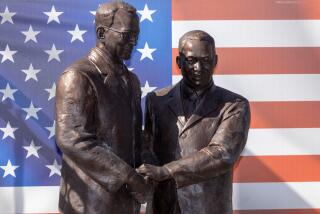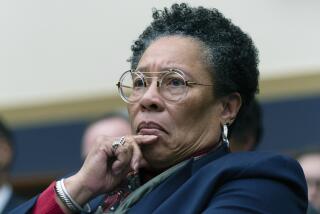Robert C. Weaver; First Black Member of U.S. Cabinet, Veteran Civil Rights Leader
- Share via
Former U.S. Secretary of Housing and Urban Development Robert C. Weaver, the first black member of the Cabinet and a longtime civil rights leader, has died in New York. He was 90.
President Lyndon B. Johnson appointed Weaver to the Cabinet in 1966. He was a pioneer in many ways.
Before that, he was a member of President Franklin D. Roosevelt’s informal “Black Cabinet,” a group of African Americans who worked with the Roosevelt administration on urban issues in the 1930s.
Under New York Gov. Averell Harriman, Weaver became the first black member of the state’s Cabinet as State Rent Commissioner in 1955.
The great-grandson of a slave, and the grandson of the first African American to earn a doctorate in dentistry, Weaver earned undergraduate and doctoral degrees in economics at Harvard University. He grew up in a Washington in a segregated suburb.
Weaver was known especially as a brilliant tactician of the black civil rights movement during its difficult early years.
This became clear even before the 1940 presidential election when Roosevelt’s press secretary, Stephen T. Early, was involved in an ugly incident in New York’s Pennsylvania Station, hurling a black policeman to the floor.
When it was suggested that Weaver gather other members of the Black Cabinet and write a speech seeking to recoup Roosevelt’s fortunes with black voters, he declined, saying a speech would not be nearly enough.
Within 48 hours, according to Current Biography, Benjamin O. Davis was named the first black general of the U.S. Army, and senior black civilian aides were named in the War Department and in Selective Service.
Later, Weaver became president of the National Assn. for the Advancement of Colored People. In 1960, he extolled the first sit-ins to desegregate lunch counters as “courageous and effective action” and a contribution to “functioning democracy.”
Through a host of government and private jobs, Weaver emerged as a preeminent candidate for Cabinet rank. But when President John F. Kennedy sought congressional support to create the Housing and Urban Development Department in 1961 and name Weaver to head it, the president encountered strong Southern opposition and shelved the plan.
Instead, Kennedy named Weaver to the sub-Cabinet post of administrator of the Housing and Home Finance Agency.
It was in this post that on March 4, 1962, Weaver took a helicopter flight over Los Angeles and endorsed federal aid for mass rapid transit in the city. At that time, the system was budgeted for a total cost of $240 million.
It fell to Johnson, under the changed circumstances of the civil rights movement and with much less opposition in Congress, to create the department Kennedy had wanted. He named Weaver to lead it. On Jan. 13, 1966, Johnson announced the appointment, and four days later Weaver was confirmed.
From the time he became an aide to Interior Secretary Harold L. Ickes in 1933, through his tenure at Housing and Urban Affairs in the late 1960s, Weaver worked for new initiatives in housing and education.
After Richard M. Nixon was elected president in 1968, Weaver turned to education, teaching at Hunter College, Carnegie-Mellon, New York University and becoming president of Baruch College.
In the 1940s, he wrote two books, “Negro Labor: A National Problem” and “The Negro Ghetto.”
He died Thursday at home and leaves no survivors.
More to Read
Sign up for Essential California
The most important California stories and recommendations in your inbox every morning.
You may occasionally receive promotional content from the Los Angeles Times.













